#Eubouleus
Photo
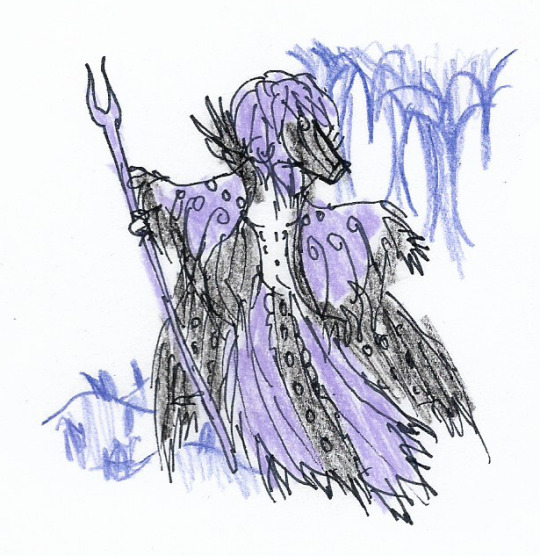
Eubuleus, epiphet of both Dionysus and Hades.
#Greek Mythology#Dionysus#Hades#Eubuleus#eubouleus#eleusinian mysteries#Orphic Mysteries#Metempsychosis#oc
13 notes
·
View notes
Text
Personal Dionysian Ritual
This is the ritual form I use for my Sunday worship (or, in this case, first-day-of-Anthesteria worship). I think this may hit closer to Catholic or Christian formats than historic Greek pagan ritual formats, at least if the book Hellenic Polytheism - Household Worship is to be believed. But this format is just a bit easier on me in terms of supplies, time, and ability to keep it semi-covert. I don't have the ability to light fires in my current space, but when I do, I usually include a prayer to Hestia at the beginning and end.

Dionysian Ritual (for Sundays) (Usually) (It's not set in stone)
Approach the altar or worship space. With you, there must be:
A bowl or other vessel filled with water (can be small).
Optionally, you may have:
Wine
Barley
Sea salt
Divination tools (I prefer tarot, or Sappho/Homeromanteions when I can get my hands on it).
A candle or other source of heat/light/incense (smells, basically)
Place the bowl of water either in front of your statue of Dionysos, or, if no statue is available, in a central spot in your space of worship. The wine and extra supplies may be placed anywhere else. Begin:
Orphic Hymn to Dionysos (Apostolos N. Athanassakis translation)
I call upon loud-roaring and reveling Dionysos, primeval, two-natured,
Thrice-born, Bacchic Lord, savage, ineffable, two-horned and two-shaped.
Ivy-covered, bull-faced, warlike, howling, pure, You take raw flesh,
You have triennial feasts, wrapped in foliage, decked in grape clusters.
Resourceful Eubouleus, immortal God sired by Zeus when He mated with Persephone in unspeakable union,
Harken to my voice, O blessed one, and with your fair-girdled nurses,
Breathe on me in spirit of perfect kindness.
After the Orphic hymn, consecrate the bowl of water to make khernips. You may add salt if desired.
Dionysian Khernips Prayer
(In between each verse of the Khernips Prayer, I move from just having the bowl on the altar, to holding the sides of the bowl, to holding the bowl up for the last verse.)
After the Khernips Prayer, I pray to Hagios as I actually ritually wash myself with the newly made khernips.
Hagios
(For every verse of Hagios, I start with washing my face, then move to washing my hands, and finally sprinkle khernips on my feet, especially if I'm planning on dancing. This isn't actual washing, but more like lightly splashing water on the different parts of me that I wash.)
After Hagios, if there is wine, then I consecrate that, which I'll link my prayer for below. If there isn't, then I libate clean water (will be writing a prayer for that at some point soon), and move on to the next part of the ritual.
Wine Consecration to Dionysos
(From the part where I say "This is the gift that..." through to "on the slopes of Mount Kithairon", I raise the wine towards my statue Dionysos as though toasting Him, which is inspired by art showing Maenads serving Dionysos wine.)
After the wine consecration, I pour out a libation of wine to Dionysos while praying my prayer to Dionysos Theoinos:
Theoinos
After the prayer to Theoinos, whatever happens next is up to you. If I'm doing any divination, I'll say a prayer to Dionysos Mantis before going ahead with it. Otherwise, I may dance, or talk about my day, or simply do prayer after prayer after prayer until I've kind of exhausted my talking point. Since most of my rituals are done at night, however, the consistent part is frequently the end, which is my second prayer to Dionysos Nyktelios:
Nyktelios II

And there you have it! I definitely finished this a bit later than I was planning, but that's okay - I got it out, and that's all that matters! I hope everyone has a good night and a beautiful Anthesteria, and that this was helpful to some degree :)
#dionysian#dionysos#dionysus#hellenic polytheism#hellenic polytheist#dionysos deity#dionysus deity#hellenic pagan#hellenic gods#hellenism#paganblr#helpol#pagan rituals#ritual#anthesteria
103 notes
·
View notes
Photo
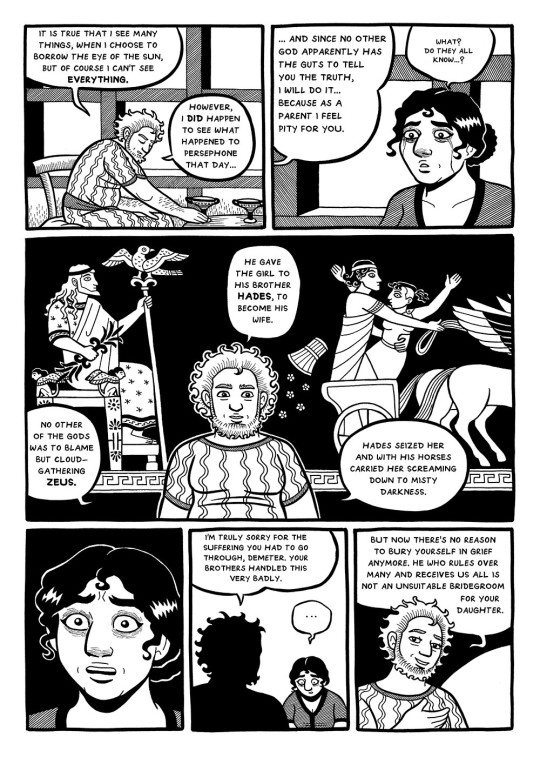
Queen of the Dead 165
Besides The Homeric Hymn to Demeter, other poets in the Archaic period also told the tale of Demeter, Hades and Persephone. According to Early Greek Myth by Timothy Gantz, what survives, though, are chiefly minor variations in detail. For example, in Orphic traditions Demeter didn't learn from Helios what had happened to her daughter. During her stay in Eleusis she learned about it from Eubouleus and Triptolemos who had happened to witness the abduction.
I was tempted to use this version in my comic, since involving Helios was a bit complicated (I had early decided that the sun is the real sun in my version, not a god and his chariot. And if there really was a god that could see everything, lots of things could be solved very easily). But the mortals wouldn't be able to tell Demeter about Zeus' involvement, unlike Helios (who either could have seen Zeus and Hades talking, or simply have heard about it from other gods). I also didn't have the heart to let Demeter be left in the dark for longer than nine days. ^^
262 notes
·
View notes
Text
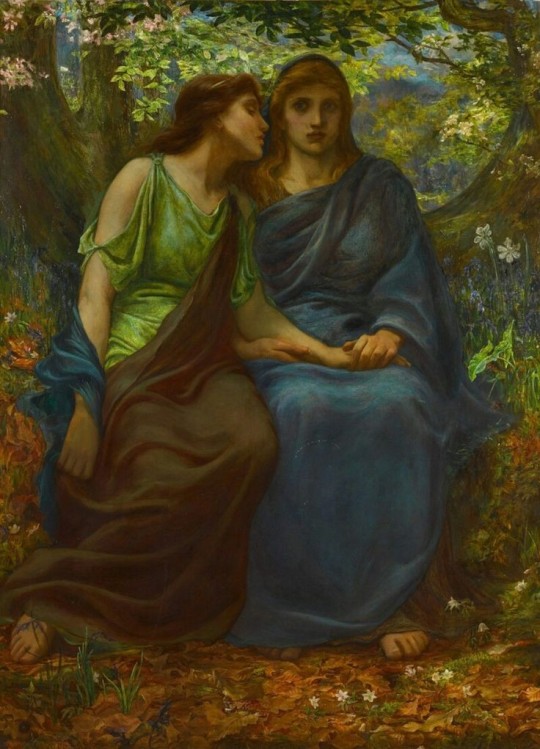
Faces/Gods/Heroes participating in the Eleusinian drama: Although we may not know exactly how the plot unfolded or what roles each hero or god played we find these present (our source is ancient art depicting facets of the Mysteries): Triptolemus, first priest of the Mysteries and son of the Eleusinian King Celeus, goddess Demeter, mother of Persephone (usually mentioned as Kore), Persephone, queen of the Underworld, Dionysus in his role as Pluto, Semele, mother of Dionysus. Elsewhere we find: Demeter accompanied by the child Pluto and her daughter Persephone, the hero Eubouleus, Triptolemus, Herakles, Dionysus, again Dionysus' mother Semele. Other persons: Aphrodite, goddess of the divine marriage to happen, Hermes and Athena, liitle child Iacchus, Zeus in his throne, close to him Hera.
Art: Demeter and Persephone by John D Batten
#mythology#art#symbolism#ancient greece#greek gods#mysticism#eleusis#greek myths#eleusinian mysteries#heroes#gods#demeter#pluto#persephone#semele#dionysus#john d batten#initiation
18 notes
·
View notes
Text



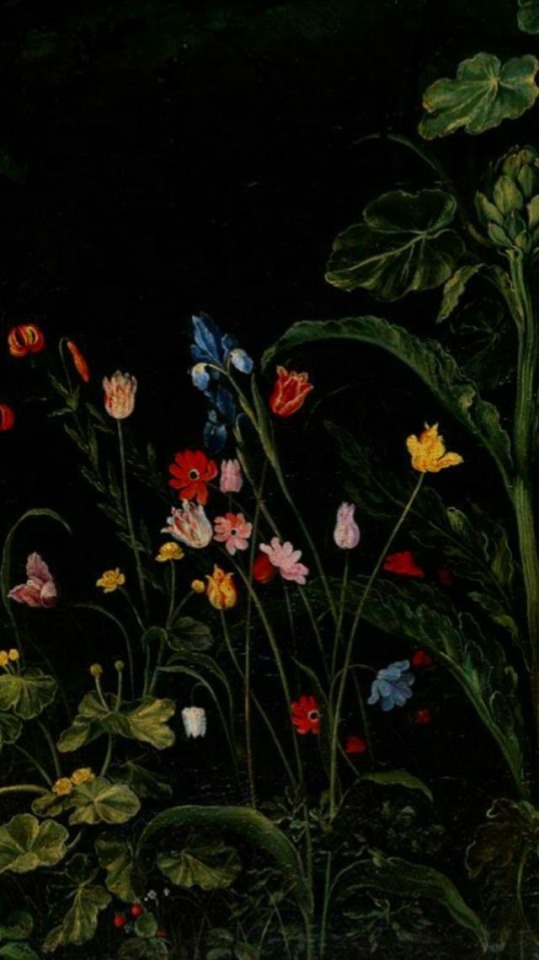

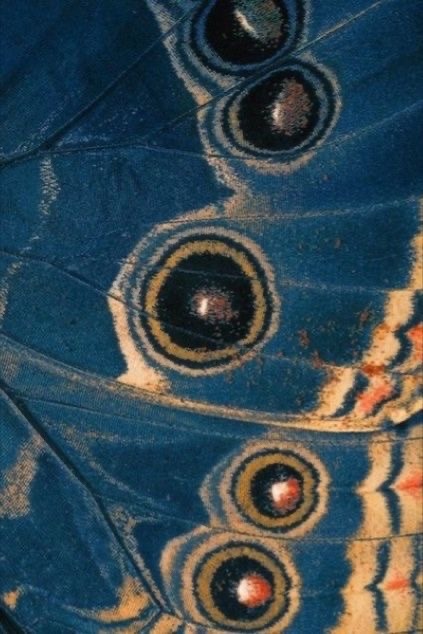
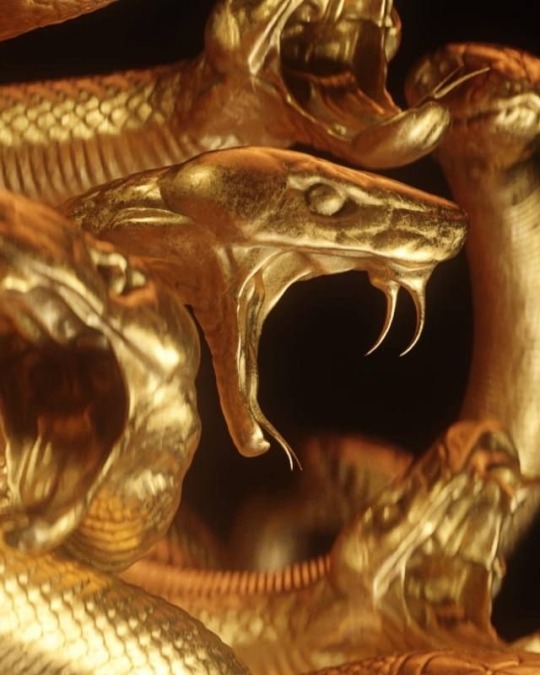

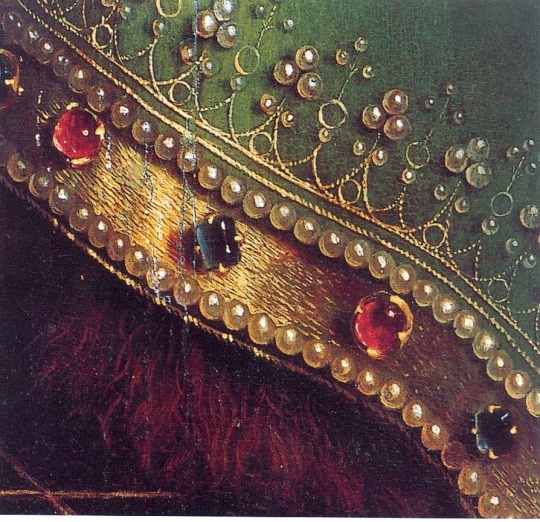
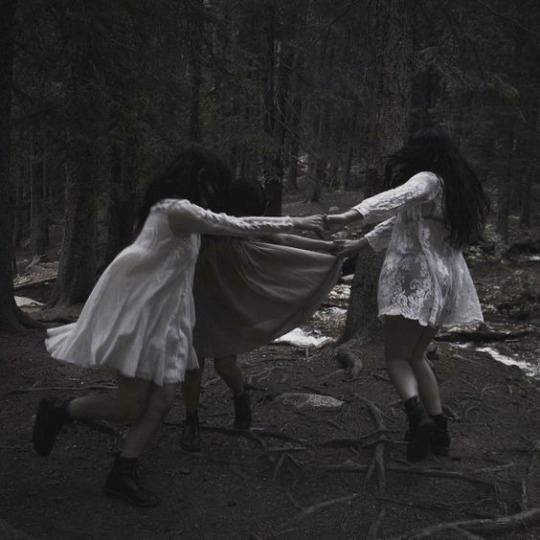
Of noble King Hades Eubouleus, I will sing…
🪦💎👑🐺🪦💎👑🐺🪦💎
All images found on Pinterest
#aidoneus#e offering#hades#hades deity#hellenic pagan#helpol#king aidoneus#king hades#lord aidoneus#lord hades#pinterest#moodboard#Greek mythos
21 notes
·
View notes
Text
Hades Deity Guide

Who is Hades?
Known by many names, Hades is the Greek god who reigns over the Underworld. Some say he was duped or swindled by his brothers or simply lost a drawing of lots when it came to choosing their domains. He is the husband of Persephone and ruler of funerary rites.
Parents and Siblings
Kronus (father)
Rhea (mother)
Zeus (brother)
Poseidon (brother)
Demeter (sister)
Hera (sister)
Hestia (sister)
Lovers or Partners
Persephone (Wife)
Minthe (lover before Persephone)
Leuce (lover before Persephone)
There was also a mortal woman who claimed that Hades was in love with her, some say her name was Theophile (which means “one who loves god”)
Children
Though it varies by storyteller whether or not Hades is their father, these beings have been said to be his offspring:
Zagreus (son)
Macaria (daughter)
Melinoe (daughter)
The Erinyes: Alecto, Megaera, and Tisiphone (daughters)
the mothers of these beings are up for debate as well.
Epithets
Aïdes (“the Unseen”)
Pluto or Pluton (“the Wealthy One” or “the Giver of Wealth”)
Clymenus (“the Renowned”)
Eubouleus (“Good Counsellor”)
Chthonios “chthonian Zeus”)
In Greek:
Adesius, his name in Latium. It is expressive of the grace.
Agelastus, from his melancholy countenance.
Agesilaus, expressive of his attracting all people to his empire.
Agetes or Hegetes, a name assigned to him by Pindar, as to one who conducts.
Aidoneos, this name is probably derived from Hades' having been sometimes confounded with a king of this name among the Molossi, whose daughter Persephone, Theseus and Pirithous attempted to carry off.
Axiocersus, or the shorn god, a name of Pluto in the mysteries of the Cabiri: he was there represented as without hair.
Iao, his name at Clares, a town of Ionia.
Moiragetes, his name as guide of the Fates.
Ophieus, his name as the blind god among the Messenians: it was derived from their dedicating certain Augurs to him, whom they deprived of sight at the moment of their birth.
In Latin or Etruscan:
Altor, from alo, to nourish.
Februus, from Februa, signifying the sacrifices and purifications adopted in funeral rites.
Feralis Deus, the dismal or cruel god.
Lactum, his name among the Sarmatians.
Larthy Tytiral, sovereign of Tartarus, his name in Etruria.
Mantus or Manus, the diminutive of Summanus, an Etruscan epithet.
Niger Deus, black god, his epithet as the god of the Infernal Regions.
Opertus, the concealed.
Postulio, a name assigned to him by Varro, under which he was worshipped on the shores of the lake Curtius, from the circumstance of the earth's having opened at that spot, and of the Aruspices having presumed that the King of Death thus asked for (postula, I ask,) sacrifices.
Profundus Jupiter, deep or lower Jove, from his being sovereign of the deep, or infernal regions.
Quietalis, from quies, rest.
Rusor, because all things return eventually to the earth.
Salutaris Divus, a name assigned to him when he restored the dead to life.
Saturnius, from his father Saturn.
Soranus, his name among the Sabines, in the temple dedicated to him on Mount Soracte.
Stygius, from the river Styx.
Summanus, from summus manium, prince of the dead.
Tellumo, a name derived from those treasures which Pluto possesses in the recesses of the earth. Tellumo denotes (according to Varro) the creative power of the earth, in opposition to Tellus the productive.
Uragus, expressive of bis power over fire.
Urgus, from urgeo, to impel.
In Egypt:
Amenthes, a name of Pluto among the Egyptians. Plutarch informs us, that the word Amenthes has a reference to the doctrines of the metempsychosis, and signifies the "place which gives and receives";' on the belief that some vast gulf was assigned as a receptacle to the souls, which were about to animate new bodies.
(Thank you to Wikipedia for compiling most of this list of these epithets)
Notes
The Underworld often bares his name, also being called Hades. Though it is also referred to as “the house of Hades” or Tartarus
Hades also oversaw the judgment of souls after death, though he was not usually a judge himself. The three judges of the dead are Rhadamanthys, Minos, and Aeacus.
Similar to Thanatos, Hades is often depicted as cold or stoic and did not often get involved with mortal affairs. Despite this, he and the Underworld were treated with respect and honor, often receiving sacrifices and kind epithets.
As some of the above epithets suggest, Hades is also seen as a god that reigns over wealth and fertility.
Hades was mentioned often in mythos but rarely appeared himself.
Perhaps his most popular myth is the Abduction of Persephone.
Hades was considered by some to be infertile and unable to produce offspring
I have to mention Cerberus, Hades’ three-headed dog that guarded the Underworld.
According to Aphrodite in one myth, Cerberus is particularly fond of cake.
Hades is mentioned multiple times in the original Greek text of the Bible as the realm of the dead, this was translated into “hell”.
Modern Deity Work
As always, traditional or historical correspondences will be marked with a (T)
Correspondences
Rocks/Stone/Crystals
Obsidian
Jet
Garnet
Sapphire
Herbs/Plants
White Poplar (T)
Pomegranate (T)
Cypress
Mint (T)
Black Narcissus
Basil
Animals
Dogs
Sheep
Cattle
Screech owl
Horse
Serpent
Symbols
Cornucopia (T)
Chariot (T)
Key
Horn of Plenty/drinking horn (T)
Offerings
Bones
items or imagery of the items listed about
Coins (T)
Wine or other alcoholic beverages (T)
Olive oil (T)
Imagery/symbols of his wife, Persephone
Acts of Devotion
Research him and Persephone
Clean up cemeteries (with permission!)
Spirit work
Create art/songs/poems for him
Study funerary rites of the past and present
Of course, your personal experiences and correspondences with Hades will be more powerful and hit harder than any list on tumblr, so don't take these as written in stone!
References and Further Reading
Hades - Theoi Project pt 1
Hades - Theoi Project pt 2
Hades - Britannica
Hades - Greek Mythology.com
Hades - World History
Hades’ Cults - Theoi Project
Worshipping Hades - Deathwitchenvy
Hades Offerings - @Twelfthremedy
Devotees and Followers to check out:
(please message me if you are a follower or devotee of Hades' and would like to be added as a resource that someone could reach out to in regards to him!)
157 notes
·
View notes
Note
thank you for the advice! it was actually really helpful, as i tend to forget about "mundane over magic", so gotta look at my actual health first
im currently interested in worshipping persephone, hades and hekate. also one ouranic deity: tyche. im mostly placing offerings at their altars atm as i dont really understand how to properly communicate, but yesterday night i tried talking to them mentally and lighting candles, and the flames seemed to react? tyches candleflames were high, one of them was smoking (both of my candles for her are identical) and both of them were dancing towards me (once again, mundane over magic, but there was no draft in the room). hades, persephones and hecates candleflame was high and flickering very aggressively (mundane over magic, but it was actually the first time i saw a candleflame behave like that in general).
once again thanks for your advice!
Hey, Nonny, thank you for elaborating for me!
I'm glad my advice was helpful to you. Especially as a beginner, it's super easy to get caught up in a mindset that focuses more on spiritual causes than mundane causes, so no sweat. Know it happens to many people!
I'm going to put a "read more" because this post is super long after this point. 💀
In regards to how you're worshipping these deities, it sounds like you're off to a great start! Interpreting candle flames is actually a known form of deity communication and divination, so it makes sense that you noticed reactions within the flames. That's already a form of communication you can practice and look more into! This is known as pyromancy and was a historic practice used to discern messages and omens from the gods. Here's a pretty good guide to pyromancy, but please know that all divination is highly intuitive and should mostly be interpreted in your own way for the best results (this takes practice). Also, if you're looking for more ways to communicate with deities, I recommend checking out my pinned post. The Deities & Entities, Hellenic Polytheism, and Divination (← will be updated soon) sections may be particularly helpful to you.
When it comes to worshipping deities, just in general, there is no right or one way to do it. There is no "proper" way which is why it's difficult to give specific advice on. Different things work better for different people. If you're interested in worshipping them in a way that emulates historic worship, I recommend you do your own research on these deities and their ancient cults. I do incorporate historic practices into my personal worship, but I don't emulate them exactly, so I'm honestly not the best person to ask about that specifically. Honestly speaking, giving basic offerings and bonding with your deities are all you really need at a base level. If you want to do more, however, such as rituals or the like, those are things you'll need to do your own research for (using Google Scholar and reading books on the topic because you don't want to get this info from some rando online; it's best to go to the most reliable sources first with these deities especially).
I will say that historically, Hades was never mentioned directly by name out of fear of inviting death to one's doorstep. He was often referred to by alternate names, such as Aides, Aidoneus, Zeus Meilichios, Zeus Eubouleus, Dis Pater (Roman), and Pluton (Roman). The "Zeus" names might seem quite odd, but ancient Greeks would refer to Hades as "the other Zeus" or "another Zeus" to avoid saying his name directly while still showing him respect. This doesn't have to be a rule you follow, as many modern worshippers of Hades don't seem to, but I figured I'd share this fact so that you know about it at least.
Some advice I will give regarding Persephone is to not buy into the portrayals of her relationship with Demeter being abusive or shitty that modern media so often depicts. The original hymn that tells the story of Persephone is called the "Hymn to Demeter" (I recommend you read the ancient hymns and myths; it can provide further context for things as well as information about deities; most can easily be found on Theoi.com) for a reason. The myth of Persephone being kidnapped by Hades was very culturally impactful in ancient Greece, especially for mothers who often saw their daughters being pawned away to unknown men without their consent. For many mothers, seeing Demeter be able to stand up to the men who took her daughter from her was an immensely powerful statement, as well as Demeter still being able to see Persephone, if only for half of the year. There are other interpretations of this myth as well that explain other cultural and religious impacts of it, such as the story being a metaphor for the death of a child. The main point I'm making is not to believe that Demeter treats Persephone like ass and/or that Persephone went to the Underworld of her own free will (based upon the mythos) because that is straight up never mentioned in any ancient Greek texts; it is a solely modern invention. Be respectful when/if Demeter is mentioned; this advice may not seem very relevant, but you'd be surprised how many people are misinformed about this myth and trash Demeter for doing something she quite literally never did in the myth itself.
Regarding Hekate, I will say that she has often been conflated as the "Triple Moon Goddess" or "The Maiden, The Mother, and The Crone". This is something created solely by the Wiccan religion and is not historically accurate at all. She was never seen as having those roles. She was still said to have three faces, however, and was seen as the goddess of the crossroads and doorways. In the myth of Persephone's kidnapping, Hekate is the one who witnessed Persephone's abduction and offered to help Demeter find her kidnapped daughter. I know a few people who worship Hekate in a more esoteric sense which is 100% an option if that path interests you. I can ask someone for things you can read about going down that path if you'd like.
Unfortunately, I don't know much about Tyche. I honestly haven't looked into her before and don't know much about the ways she was worshipped in the past. Something that was a common thing for Ouranic deities specifically, though, was burning offerings (only if safe to do so) and letting the smoke travel upwards to the sky. It was believed that the smoke would reach Olympus itself which was how the Ouranic gods received those offerings, especially food offerings of meats. That's all the useful info I can likely give about Tyche.
I hope these things are helpful to you, although I'm unsure if this is the exact advice you were hoping for. Have a great day/night. 🧡
7 notes
·
View notes
Text
I call upon loud-roaring, reveling Dionysos, primeval, two-natured, thrice-born Bacchic lord, savage, ineffable, secretive, two-horned and two-shaped, ivy-covered, bull-faced, warlike, howling, pure. You take raw flesh in triennial feasts, wrapped in foliage, decked with grape clusters, resourceful Eubouleus, immortal god sired by Zeus when he mated with Persephone in unspeakable union. Hearken to my voice, O blessed one, you and your fair-girdled nurses, breathe on me in a spirit of perfect kindness.
- Orphic Hymn 31. To Dionysos
40 notes
·
View notes
Text
Hellenic Gods Fact Sheets and Hymns: Zeus
Zeus
Other Names: Jupiter, Jove, Kronion
Epithets: Agathos Daimon (good spirit), Basileus (king), Anax (king), Kronion (son of Kronos), Epidotes (giver of good things), Hypatos (most high), Sthenios (the powerful), Alastor (avenger), Alexikakos (averter of evil), Apemios (averter of evil), Amboulios (counsellor), Eubouleus (of good counsel), Koryphaios (leader), Areios (of war), Stratios (of the armies), Klarios (distributes by lot), Kosmetes (orders the cosmos), Panoptis (all-seeing), Astrapaios (of lightning), Keraunios (of thunder), Kataibates (descending [lightning]), Ikmaios (of moisture), Ombrios (rain-giver), Hyetios (of the rain), Aphesios (releasing), Meilichios (the gracious), Lykaios (of the wolf), Maimaktes (the boisterous), Moiragetes (leader of fate), Nomos (of the law), Xenios (of strangers), Phyxius (of refuge/banishing), Olympios (the Olympian), Polieus (protector of the city-state), Morios (of olive trees), Panhellenios (of all Greeks), Skotitas (the dark), Teleios (of marriage), Soter (savior), Sthaenios (strong), Katharsios (purifying), Epoptes (overseer), Invictus (invincible), Pangratis (all-powerful).
Domains: Storms, the sky and atmosphere, political power, dominion, sovereignty, rulership and kingship, divine counsel, law and justice, cosmic order, fate and destiny, maintaining oaths and xenia, avenging the wronged.
Appearance: A powerful and well-built older man with tanned skin, long stormy-gray hair and beard, and piercing blue eyes. He wears a sky blue or dark blue cloth around his waist. His aura is stormy-blue.
Sacred Days and Festivals: The Olympic Games. Theogamia (27 Gamelion). Pandia (17 Elaphabolion). Demokratia (12 Boedromion). Olumpeia (19 Mounuchion). Bouphonia (14 Skirophorion. Diasa (23 Anthesterion).
Symbols/Attributes: Thunderbolt, throne, scepter, the Aegis.
Sacred Animals: Eagle, bull, swan, goat (to a lesser extent), cuckoo, wolf
Sacred Plants: Oak, olive
Elemental Affinity: Air
Planet: Jupiter
Colors: Blue, white, yellow, gold, purple.
Crystals: Diamond, clear quartz, smoky quartz, opal, lapis lazuli
Incense: Frankincense, sage, vervain.
Tarot Cards: The Emperor, The Wheel of Fortune, King of Swords
Retinue: Hermes, Nike, Kratos, Zelos, Bia, Themis, Iris, the Moirai, the Horae, Hestia, Ganymede, Hebe, Pegasus, Metis (technically?).
Associated People: Kings, lawmakers, strangers and immigrants.
Offerings: Animal fat and bones, whiskey, cinnamon, oak leaves, storm water, eagle figurines, donations to eagle conservation or climate change research.
Syncretized With: Ammon, Osiris (Sarapis), Taranis, Perun, Indra, Sabazius.
Hymns to Zeus
Homeric Hymn 23 to Zeus
I will sing of Zeus, chieftest among the gods
and greatest, all-seeing the lord of all,
the fulfiller who whispers words of wisdom
to Themis as she sits leaning towards him.
Be gracious, all-seeing Son of Kronos,
most excellent and great.
Orphic Hymn to Zeus
Of Zeus much-honor’d, Zeus supremely great,
To thee our holy rites we consecrate.
Our pray’rs and expiations, king divine,
For all things round thy head exalted shine.
The earth is thine, and mountains swelling high,
The sea profound, and all within the sky.
Kronion king, descending form above,
Magnanimous, commanding, sceptered Jove;
All-father, principle and end of all,
Whose pow’r almighty shakes this earthly ball;
Even Nature trembles at thy mighty nod,
Loud-sounding, arm’d with light’ning, thund’ring God.
Source of abundance, purifying king,
O various-form’d from whom all natures spring;
Propitious hear my pray’r, give blameless health,
With peace divine, and necessary wealth.
Orphic Hymn to Zeus Astrapaios
I call the mighty, holy, splendid light,
Aerial, dreadful-sounding, firey bright,
Flaming, aerial-light, with angry voice,
Lightning thro’ the lucid clouds with horrid noise.
Untam’d, to whom resentments dire belong,
Pure, holy pow’r, all-father, great and strong,
Come, and benevolent these rites attend,
And grant my days a peaceful, blessed end.
Orphic Hymn to Zeus Keraunos
O Father Zeus, who shak’st with firey light
The world, deep-sounding from thy lofty height:
From thee, proceeds th’ ethereal lightning’s blaze
Flashing around intolerable rays.
Thy sacred thunders shake the best abodes,
The shining regions of th’ immortal gods:
They pow’r divine, the flaming lightning shrouds,
With dark investiture, in fluid clouds.
‘Tis thine to brandish thunders strong and dire,
To scatter storms, and dreadful darts of fire;
With roaring flames involving all around,
And bolts of thunder of tremendous sound.
Thy rapid dart can raise the hair upright,
And shake the heart of man with wild affright.
Sudden, unconquer’d, holy, thund’ring God,
With noise unbounded, flying all abroad;
With all-devouring force, entire and strong,
Horrid, untam’d, thou roll’st the flames along.
Rapid, ethereal bolt, descending fire,
The earth all-parent, trembles at thy ire;
The sea all-shining; and each beast that hears
The sound terrific, with dread horror fears:
When Nature’s face is bright with flashing fire,
And in the heavens resound thy thunders dire.
Thy thunders white, the azure garments tear,
And burst the veil of all surrounding air.
O Zeus, all-blessed, may thy wrath severe,
Hurl’d in the bosom of the deep appear,
And on the tops of mountains be reveal’d,
For thy strong arm is not from us conceal’d.
Propitious to these sacred rites incline,
And crown my wishes with a life divine:
Add royal health, and gentle peace beside,
With equal reason, for my constant guide.
Disclaimers: Descriptions of the gods’ appearances are purely a record of how I personally see them. Gods are shapeshifters that can appear however they wish, and will be perceived differently by different people. My own perceptions of them may or may not match ancient artwork.
Correspondences listed are mostly modern.
Festival dates are based on the Attic calendar.
Offerings listed are all specific to the deity in addition to standard ones.
Translations of hymns are from Theoi unless otherwise specified.
Sources:
THEOI GREEK MYTHOLOGY, neosalexandria, HellenicGods.org, κοράκι/crow’s grimoire
#zeus#zeus god#zeus greek god#zeus greek mythology#greek gods#greek mythology#olympians#twelve olympians#fact sheets#hellenic pantheon#hellenic paganism#hellenic deities#hellenic polytheism#ancient greek hymns#homeric hymns#orphic hymns#helpol
97 notes
·
View notes
Text
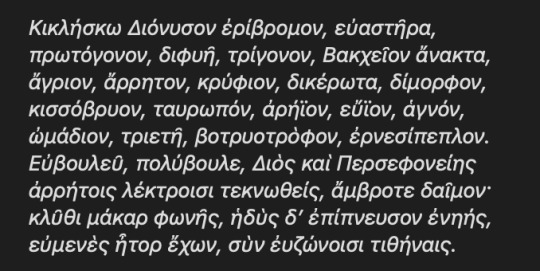
I call upon loud-roaring and reveling Dionysos, primeval, two-natured,
Thrice-born, Bacchic lord, savage, ineffable, two-horned and two-shaped.
Ivy-cover, bull-faced, warlike, howling, pure, you take raw flesh,
You have triennial feasts, wrapt in foliage, decked with grape clusters.
Resourceful Eubouleus, immortal god sired by Zeus,
When he mated with Persephone in unspeakable union.
Hearken to my voice, O blessed one, and with your fair-girdled nurses,
Breathe on me in spirit of perfect kindness.
— trans. Apostolos N. Athanassakis

2 notes
·
View notes
Text
Lmao you fools I need the Demeter family headcanons or else I'll die so here they are:
But first, for context:
Demeter had fallen in love with Iasion while at the wedding celebration of Kadmos and Harmonia in Samothake, (protip, never look into the family tree in mythology, it aught to save you like another road that doesn't lead to Alabama) and laid with him in a field. Such affaire produced Ploutos and Philomelos. Later on, Zeus God of ruining everything, decided to strike Iasion, killing him, and then taking Demeter from which this other nonconsented union came Persephone. Later on though not specified again and this mostly on my theorithical part, Demeter would have had another consort that being the cretan demigod Karmanor (sometimes identified with Iasion with both being consorts but Karmanor located in crete while Iasion was in ) and with him had Eubouleus and Khrysothemis, whom the former boy had his and swallowed by the earth when Hades kidnapped the Persephone. After which, Demeter, in her search of Persephone, had been followed by Poseidon who also didn't know how to keep it in his pants and from him she gave birth to Despoine and a horse Arion.
Of course myths aren't nesesairly traced well so I'll link the sources and more info in a reloj hours later If you are interested for more on the demeter fam.
Anyways.
Headcanon time:
Persephone is the middle child. Ploutos and Philomelos are the older twins, Euboleus is the younger brother by a year, yet Persephone treats him as though she is older because he is just a demigod. Khrysothemis is almost last with Despoine and Arion being the younger twins.
Ploutos has spoiled Persephone a lot, he is the god of ritches after all, and even if he can't see he always claims that his sister is the best! (Bad choice of words ploutos, don't let the gods get any ideas—oh there goes apollo)
After Ploutos was struck blind by Zeus, Persephone cleaned up his wounds and helped him adjust in a world of pure darkness (since Philomelos never got along with his brother and thought he deserved such punishment). As such, when Persephone was trapped in the Underworld and afraid of the new world she had to get adujsted to, after Zeus basically gave off her daughter to another God without a blink, Ploutos whom his ritches would connected to the eyes of the earth, would send down jewels of sorts for Persephone, hoping to give her some sort of relief from being away from her family.
As for Philomelos, He was unlike his brother, quite hardworking and skilled in engineering, so after hearing of Persephone's kidnapping, he too tried to help out, searching everywhere through the stars for the goddess but could never meet her.
When Helios answered to the grievinh Demeter, for the first time Philomelos and Ploutos made up to take care of their mother, alongside Khrysothemis who sang beautiful tunes with her flute.
Thanks to Euboleus and Triptolemos (a soon demigod of the Eleusinian mysteries, you know, the one whom demeter raised) Demeter is always told as such about how Hades is treating her, so it help ease the winter a little more each day.
Persephone has raised alongside Euboleus the two children from poseidon, eventually Despoine was brought with Persephone to the Eleusinian mysteries, and Arion just likes to carry his sisters around as they sing one of Khrysothemis' new songs.
Persephone often jokes that Ploutos and Hades are quite alike, detesting almost everything and moody when it comes to their work as gods. Ploutos is like "What? No!" But then when he goes to meet the brother in law, they actually have a lot in common saying how much they don't like Zeus "He blinded me!" "His children cause too many problems in the underworld!" As well as the humans who are quite greedy. So they both do respect each other, and Philomelos-Bootes laughs about it all the time that Ploutos might become the god the underworld at this point. He got kicked back again to the stars.
Philomelos and Euboleus do get along really well, often making a lot of gardening tools to help their mother Demeter.
Not long after Iasion was killed, fearing that Zeus might try to attack the children, Demeter had left Ploutos on the hands of Tykhe, goddess of Fortune. Meanwhile Philomelos stayed with her since he was more of ademigod rather than a full God like his brother.
Khrysothemis played at the wedding of Persephone, the one where Demeter finally attended and, though hesitating, gave the blessings to Hades.
Karmanor did his best to be as good of a father as he could to all of them, even Persephone, Ploutos and Philomelos who where a few years old (around 3 and 7 respectively) and powerful children. He loved them all eitherway.
Karmanor is their only dad, say all the children of Demeter. (He is a demigod, not even full god..)
Triptolemos, Polyxeinos and Diokles aren't excluded here they are also part of the family and get to drives epic dragon chariots with the other siblings, often having chariot races for fun.
Despoine was gifted her cloacks by Khrysothemis after the other wore her clothes and were too lose for the little Despoine at the time. Eventually the cloacks would be filled with little adorning gems and trinkets by her siblings.
#demeter#hades#hades and persephone#greek myth retellings#headcanons#greek myths#au#ploutos#iasion#Euboleus#arion#despoina#philomelos#Triptolemos#carmanor
14 notes
·
View notes
Text
The beginning of the [Homeric] Hymn [to Demeter] reverberates with ritual force and mystery. Each image of beauty and life is also an image of death. The golden wheat Demeter holds is synonymous in Greek with the sickle that harvests it (chrusaoras). The narcissus in its hundred-headedness gleams wet with fertility, yet Hades, who mirrors the narcissus' multiplicity through his name, Polydektes, "receiver of many," is the god of death in the under- world. This narcissus is the seducer of the Kore, and will lead to her death and fertilization through her own plucking of it. It is honored in its holiness by all mortals and immortals. Even the sea, the earth and sky smile in the sweetness of its scent. But the smiling, gaping mouth presages the gaping earth that will swallow the Kore. The word for gape in Greek is chazdo, reminding us of the word chaos, or chaos, from the same root. The narcissus is itself called athurma, which, although adequately translated "toy," or "plaything," also implies an object of magical transformation."
Thus the opening imagery of the poem suggests that all the powers of nature acquiesce in the descent of the Kore as part of a magical and fertile cycle of transformation. The female powers are implicated in this as well. For we learn that this "toy" or athurma itself is given "as a deception" or dolon by none other than Gaia, the Kores grandmother. When we put this together with the description of the Kores face as a "bud about to bloom" (kalukopis) and with the description of her playmates, the daughters of Okeanos, as blossoms; when we learn that the word korai (plural of kore) means the "shoots of plants," there can be little question that the Kore is also identified imagistically with the narcissus. As she reaches out with both hands, "amazed," thambas, a word having connotations of being struck with ritual ecstasy, to take the athurma, one cannot help but wonder if the Kore is not in some sense involved in an act of self-plucking. We can certainly infer that she is caught up in a transformative act of death and rebirth, and that, speaking ritually and metaphorically, she draws to herself her own destiny.
Further ritual implications of the imagery are embedded in the mythemes. For one, the maidens are in a leimon or "meadow." In Greek myth, it is difficult to be in a meadow without encountering doom. Meadows are places where death happens. But the word leimon also means female genitalia. To read through the images then, as the "bloom" is plucked from the "meadow" the virgin is deflowered and the genitalia open to disclose the yawning chasm which is the original place of birth and death, the womb of mother earth from which we all come and to which we all return. And, as we know, although Polydektes may be identified with the narcissus through the equation of multiplicity, in the Hymn, Gaia herself, not the "Receiver of Many." sends the narcissus.
At the same time, the poem tells us that Gaia’s dolon, or "deception," was grown "at the will of Zeus," Dios bouleisi. Is this not a clear mark of patriarchal domination? Yes, on the explicit, narrative level of the text. But implicitly there may well be a linguistic pun here that would resonate in the thematic repertoire of the oral poet, between the words Dios bouleisi and Eubouleus, who turns up in an Orphic version of this myth as the swineherd who falls into the chasm with his pigs together with the Kore.'" Swineherds are intimately related to sows and boars, both of which were sacrificed to Demeter and Persephone. Further, in the Thesmophoria, the other major Demeter festival of the year and an exclusively womens rite honoring fertility, pigs themselves are thrown into the earth at the time of female menses and then dug up again along with snake idols." Again it would seem that the ritual mystery is orchestrated not by males but by females, who understand fully the nature of the cycles of birth, decay and rebirth.
-From "Ritual Death, Patriarchal Violence, and Female Relationships in the Hymns to Demeter and Inanna" by Marcia W. D-S. Dobson
#persephone#demeter#Eleusinian Mysteries#quotes#greek myth#i can't help noticing that the 'toy' or 'plaything' here resembles the toys of dionysus in orphic myth
4 notes
·
View notes
Text
fun little life rant/reflection
this ended up being a lot longer than i was going to write, oops!
i've been having a bit of a rough time with my mental health lately (hence the relative silence on here), and because of that, i haven't had the energy to properly pray to Dionysos. it's been a bit upsetting for me to have gone so long without doing so. a few nights ago, i didn't even pray, but simply thought about praying to, Dionysos Eubouleus for some help.
and things did get better. not automatically, not so drastically that i noticed it the day of, but they did get better. the first thing that happened after praying to Him was me going to sleep. and i had a dream of going into a pasture where i could do some work in order to pet the animals. i ended up asking if i could sit in the pasture before i did the work, just because i was so weary. i was allowed in, sat down in a pile of hay, and just breathed. while i was there, a large, dark brown bull came over to me, sat down next to me, and lay his head in my lap. after spending a while like this, i felt better, and went up to do the work that i initially came there to do.
anyways, there were some other dreams that night pertaining to more personal aspects of my worship that made me figure that the series of dreams in general was from Dionysos. and while it definitely helped reinvigorate me after such a rough go with my mental health, it also helped me realize a few other things. first off, i think there's a habit that i have to think that when i'm not actively worshiping or even just calling out to the Gods, They don't see me, or at least aren't paying attention to me. but like in the dream, even if i'm not actively doing things, the Gods are still around me, and They care enough to be with me when times are tough, even if i don't necessarily have the energy to give back. this is really what kharis is all about, in my opinion - building up a mutual relationship of trust and giving. the Gods know that when you have bad days, it's not the full experience of you They are getting. and then when you as a worshiper find that the Gods appear to be taking a step back, you can have the trust that They have not fully abandoned you on their end.
i could really go on and on about this, but this has gone on a lot longer than i was initially planning on, so i'll leave this off here :) i hope all of you beautiful internet people have an amazing night, and may the Gods send you good dreams to comfort you when needed <3
#dionysian#dionysos#dionysus#hellenic polytheism#hellenic polytheist#dionysos deity#dionysus deity#hellenic pagan#hellenic gods#hellenism
12 notes
·
View notes
Text
Character Intro: Britomartis (Kingdom of Ichor)








Nicknames- Bri by Artemis and the others in the pantheon
Lady of Nets by the people of Olympius
Age- 16 (immortal)
Location- Crete, Olympius
Personality- She's a proud loner with a strong independent spirit. She's extremely observant, cunning, & manipulative. She's well known for her twisted sense of humor. She's single.
She has the standard abilities of a goddess except shapeshifting. Being the goddess of mountains, hunting & fishing nets, she has many skills and abilities like being a master pickpocketer & being an excellent tracker (can track someone from a single item of clothing or a single strand of hair). She can also innately sense other kinds of traps as well as being able to disarm them, regardless of its complexity.
Bri calls a few places "home." She spends most of her time in Crete where she lives on a houseboat. In New Olympus, she has an apartment in the Lunar district as well as a cabin in the Celestial Woods. In her cabin, there's a whole array of different trapping nets, bows, arrows, & shotguns.
She always carries a lock-pick (that also doubles as a key chain) that can fashion itself to pick nearly any type of lock.
Her go-to drink is bamboo tea (with a few splashes of almond milk). She drinks it out of a thermos which she always brings. She also likes cola, mint infused water, and root beer flavored soda. Her usual from The Roasted Bean is an olympian sized iced green tea.
Her favorite thing from The Bread Box is the roast beef sandwich.
She's currently not on speaking terms with her mother Karme (demi-goddess of the harvest). It all stems from her mother's refusal to reveal the identity of Bri's father. She does however keep in touch with her grandfather & uncle, Eubouleus (god of the swine & ploughing) and Karmanor (demi-god of the harvest) as well as her younger cousins E.B and Krysothemis.
Bri's real good friends with Artemis (goddess of the hunt & moon); as well as a few hunters in the group. She's also friendly with Apollo (god of the sun, music, poetry, healing, medicine, archery, plague, light, & knowledge), Lykos (goddess of wolves), Urso (god of bears), Hermes, Brizo (goddess of sailors, mariners, fishermen, & dreams), Nerissa (goddess of jellyfish), Ailuros (goddess of cats & warfare), Taygete (one of The Pleiades), & Pasithea (goddess of hallucinations & relaxation). Her official mentor was Ichnaea (goddess of tracking). Bri also likes her mom's best friend Pherusa (goddess of substance & farm estates).
Bri also likes her step grandmother Baubo (Barbie). Even in the most sour mood, she's probably the only one that can make Bri crack a smile before erupting in giggles! She also likes Barbie's spicy barbeque ribs and strawberry baklava.
She doesn't mind her status as a minor goddess, although she is curious to see how the MGM movement will play out. She instead focuses her attention to an important issue to her- aquatic environmentalism. She joins Tethys (Titaness of freshwater & clouds) and Poseidon (god of the sea & earthquakes) as allies to work on new bills concerning the welfare of the Underwater Kingdom (and Freshwater territories).
Her all-time favorite beauty product to use is the Sunshine Radiance dew glow serum!
For work, Bri models for Artemis' fashion brand Nocturnal Vibez. She also models for ViVoTrack, Olive Visibly, Momentum, & Vita!
Some favorite treats of hers from Hollyhock’s Bakery are the coffee cake cupcakes, the s'mores cake, and the chocolate-chocolate chip brownies!
Lately, Bri's been a fan of wearing perfume. She even made her own when she tagged along with Pasithea to a perfume making class hosted by Philyra (goddess of perfume, paper, & beauty). She picked scents of citron, mandarin, fresh ginger, magnolia, orange blossom, laminaria blossom, amyris, grey amber, and cedar.
She's currently questioning her sexuality.
Her favorite meal is venison stew, making it herself using the meat of the game she hunts. For seafood, she likes pan fried trout & fish sticks. She also enjoys eating cans of tuna. Her favorite take-out order is the crispy fish sandwich (with extra tartar sauce) and olympian sized fries from Olympic Chef.
In her free time, she really enjoys going on hunting expeditions- whether it's on her own or with company (like Artemis & Apollo). She also enjoys camping, mountain climbing, fishing, swimming, kayaking, basketball, archery, reading, football (soccer), and playing video games (with Hermes).
"Why do I have to choose between the woods and the sea?"
#my oc#my oc character#my character#oc character#oc intro#character intro#oc introduction#character introduction#modern greek gods#modern greek mythology#greek myth retellings#greek goddess#greek goddesses#greek mythology#greek pantheon
8 notes
·
View notes
Text
I Still Don't Get the Point of the Pointing Machine
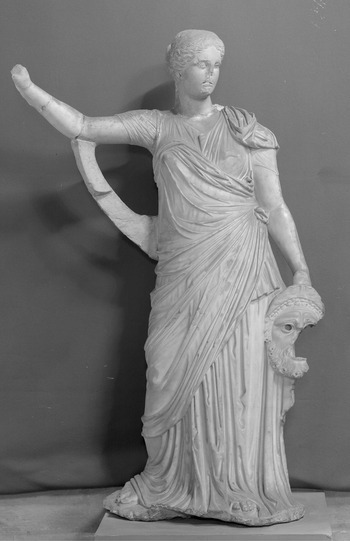
Honestly, I can’t tell whether Palagia is for or against the evidence of the Greeks and Romans using a pointing machine in the Marble Carving Techniques reading. She appears to believe that a primitive version was used but not on all marble sculptures. The puntelli on Eubouleus are not evidence of triangulation from a pointing machine, according to her. I think, given that the bust is unfinished, that they could still be evidence of early pointing machines.
I did some more research and found that evidence (puntelli) is common on many unfinished sculptures form the Hellenistic and Roman periods. According to A Handbook of Greek Sculpture and Pliny (pages 34-35), modelling in clay was mother of all kinds of sculpture, and thus not the only method. The author does not deny the use of some sort of triangulation device, but they rather make a claim that it was for a particular type of carving. However, with a pointing mechanism, a clay model could have not been necessary. The author of this work also goes on to praise the ancient sculptors because they were constantly observing the moving human form and that modern artists are mainly dependent on posed models, which doesn’t seem to be relevant for pointing machines to me. The final point this author makes (regarding a pointing machine) is that the limited number of sculptures with the visible puntelli are reserved for not the ones where the sculptor was using a clay model, but for those he “free carved.”
Honestly, the pointing machine and 3-caliper method have been such a confusing method for me to understand. I am usually good at geometry and special reasoning, and the concept of a pointing machine and calipers is to find the negative space. It was not until I read “Greek Sculpture and Roman Taste” by Cornelius C. Vermeule that it clicked. He compared using a pointing machine to a measuring jacket used by a tailor. To get measurements, you measure the points where you want a garment to hit and the ‘highest’ points of the body. The tailor can pin the fabric that isn’t necessary on the measuring jacket and compare to the unfinished garment and get rid of the unnecessary fabric using the same measurements. The puntelli are similar to chalk lines – even if the work is shipped elsewhere, as long as one has the measurements marked, a model is not necessary to be finished. To me, it seems that this method was useful for guilds with many sculptors trying to pump out as many works as they could. The master could make measurements that could be easily transferred to multiple sculptures and easily rendered by the workmen, rather than every sculpture being free carved.
Works Cited:
https://www-jstor-org.lp.hscl.ufl.edu/stable/4171481
0 notes
Text
The Good Counselor - Chapter 8


Book Three in the Hades and Persephone series. Seventy years have passed since Elysion was created, and Persephone's efforts to conceive a child with Hades have been in vain. But a secret rite on Samothrace might bend the Fates and give her all that they have dreamed of, or pave a path of untold suffering.
Chapter 8
Wind battered the west wall of the temple and guttered the torches. The winter had been a stormy one, a hard start to the season. The Thracians had worried that there hadn’t been enough sacrifices to Zeus at the Spring of Midas, The Arcadians swore that Poseidon had whipped up the seas in anger, and the Athenians worried that they hadn’t sent enough propitiations to Eleusis for Demeter.
But the summer had been kind to all. There were bountiful stores of grain— not just on Samothrace, but in every small village and great city in Hellas, Thrace, the islands and cities beyond. Orpheus stared out at the pool that dominated the center of the atrium. The oculus above and the slender clerestory windows had been sealed shut for winter, covered by tar-thatched reeds and battened down with hempen rope. It would keep the place warm for anyone seeking sanctuary. He reached the twelfth brazier and stoked it with an iron poker, the heat grown heavy beneath his woolen himation.
“Where did you hear the name Zagreus, hymnist?”
Every hair on his neck stood up. Orpheus stopped in his tracks and held his breath.
“Tell me.”
The hall was empty: the few who had sought shelter there during the day had found other places to stay for the evening. Though he was sweating in the temple’s close warmth, ice filled the pit of his stomach. He fell to his knees, his palms clammy against the stone floor, his eyes fixed on the ground. “It… i-is it you, God of Nysa?”
“After the first moon of winter, as promised,” the voice said. “Stand. There’s no need to kneel before me. It is I who come asking you for favors. Now, who gave you that god’s name?”
Orpheus swallowed. “The name…”
The visitor grew silent. He was holding his breath.
“It came in a vision. Certain herbs…” Orpheus swallowed. “I had composed a hymn to the Moirai and the residents of the lands below, the night before I came here from Eleusis. There was a ritual at the temple on the night I arrived, and all within partook of a ceremonial draught. Its ingredients had been prepared for us by a nymph-born woman who lives in the forest. This order had consumed it before, for a generation at least, but that night I saw… visions of sigils and symbols and epithets, and when I slept that night, I dreamed. I dreamed of the Mnemosyne and the waters that restore life eternal and memory to those who go to Elysion. I dreamed of a god not yet born. I saw a babe crying out, coming into the world in a flash of flame and light. I heard his name, then. And in that moment I knew that he would be the one to keep and protect Paradise itself through the ages, who would reveal its true purpose, one who could unite tribes and nations…”
There was a rustling, then the faint outlines of a very tall man with jet black hair. As he grew clearer, he lowered a polished gold helm to his side and stared down at Orpheus with eyes that had seen the rise and fall of civilizations. He spoke evenly, almost conversationally. “And in your vision the name this unborn god was given…”
“It was Zagreus. Zagreus Sabazios Eubouleus. As clear as if I were awake. And it was not only I who had that dream that night.”
“There are other mystics here?”
“I would never go so far as to call myself one.”
“If the mantle fits…”
“I merely listen. But yes, others that night heard that exact same name. Saw what I saw.”
The man— the god, rather— straightened. A faint smile teased the corner of his mouth. “Eubouleus. The Good Counselor. That epithet also belongs to another.”
“I know, my lord.”
“You know who I am, then.”
Orpheus paused. He knew it in his bones. He also knew that he risked being struck down if he was wrong. But he had trusted this god so far. Still he closed his eyes when he answered. “You are the Unseen One. The Receiver of Many.”
“You are permitted to use my name, Orpheus.”
“You’ll forgive me if I do not?”
The Unseen One nodded at him, then shifted and paced the room, glancing at the empty niches and the absence of any statuary of the gods. “I know your reasons. But in knowing why, you likewise understand why no one must learn mine nor my wife’s true identity if this is to succeed.”
“I do.”
“Have you thought on my offer?”
“It is all I have thought about these many months. Especially since time grows short.”
“What do you mean?”
“We hold these rites once every three years, on the third full moon after the first crocus blooms. This is the year.”
“I want you to know this,” Aidoneus faced him and crossed the room to stand in front of Orpheus. “If you say ‘no’ to me, there will be no repercussions for you or yours. I, Hades Aidoneus Chthonios, firstborn son of Kronos, swear it to you on the Styx. You will not have displeased me, you will not have displeased my wife, nor any other god or creature who dwells on or below the earth. And when you pass from this world and journey to mine, your choice here will have no bearing on the hereafter.”
“And what of the gods above?”
He waved his hand dismissively. “These aren’t their matters. They care nothing about this.”
“Why would you come to me— to a mortal, my lord— for something like this? We are such finite, small beings when compared to the Deathless Ones.”
“I am not an Olympian, hemitheoi , and don’t hold myself on high above your kind. Those who oversee the earth, whose lives are intertwined with the mortals and their immortal souls, cannot afford such… vanities. Your kind have a wisdom that comes from the knowledge that your lives are finite— one lifetime in which to accomplish what you can. That itself is a powerful thing. More than you, or the gods above truly realize.”
“But in Elysion we have a hope of remembering what we were,” Orpheus said, his voice growing earnest. “Of continuing on and growing and learning even after death, once we drink from the Mnemosyne.”
Aidoneus shook his head and sighed. “The words written on your scrolls, the ones you place in the mouths of the dead… are a fiction. A pleasant one, to be sure, but all who reside in my realm must drink from the Lethe. For their own sakes.”
“But…” Orpheus felt cold creep over him. The rites for the dead he’d performed for countless adherents… Were they all for nothing? “The visions I had, though, they said that you would let those who are worthy of Elysion drink from the Pool of Memory, that they—”
He shrugged. “I do not know whence those visions came to you, but rest assured… Elysion is new, but the laws that govern Chthonia remain unchanged, as they have for aeons.”
“But the memories and lives of those who are reborn—”
“And with good reason.”
The god had raised his voice. Even now, it faintly reverberated through the hall. Orpheus swallowed. His words came out thin and reedy. “I only know what I saw. As clearly as I saw the child you believe will come from this rite. If I were to say no, to say no to you , why would you let me go so easily?”
“Because it is not your decision alone. It is ananke. If a child is not meant to be made by these means, then I accept that. As does my wife.”
Orpheus let out a sigh, feeling a great weight lift from his shoulders. For all this time, he was convinced that he was being given an order by a god. “I’ll do it.”
“For the gift of a lyre?”
“No.” He paused then shook his head. “Partly. But more so because I know for certain I can trust you. And that my decision wasn’t compelled.”
Aidoneus smiled and folded his hands behind his back, then turned away from Orpheus, observing the walls of the stark temple. “My wife will be very pleased by this.”
Orpheus leaned against the column. The King of the Underworld’s voice had hitched. He was moved and didn’t want to show his emotions.
“The god revealed to you… Zagreus… that was the same name my wife and I had decided upon when we first knew we wanted to have a child of our own. We never told anyone. And this has given me reason to hope.”
He whispered. “My lord, I have hope as well, but… I can promise nothing.”
“Of course.”
“Our visions were clear, and all saw the same things come to pass. And we all saw that the Unborn One would come into this world from the womb of a mortal woman.”
“ Your visions also told you that mortals’ memories are restored in Elysion. When we dream, we see first what we know and believe. None in your order would imagine the rites being attended by gods.”
“No. Certainly not.”
“But only gods beget gods.” The Receiver of Many hesitated. “Orpheus, tell me… Eumolpus spoke of it before he passed, and you said the same this spring: that the sacrifice we’d make would be greater and unlike anything we could imagine… My wife and I have much to lose, so you can understand how that might give me pause.”
“It wouldn’t—” Orpheus shut his eyes momentarily, trying to find the right words. “It would not throw the spheres into chaos. A farmer’s crops would not wither any more than a king would lose his crown or a priest be cast out of his temple. That much I know. It would be something personal. Not a sacrifice for the Lord of the Underworld, but a sacrifice for… Aidoneus.” Orpheus shuddered involuntarily, and his gaze fell to the floor.
“You can’t be any more specific?”
“I am sorry, my lord. I cannot,” Orpheus said. “It is not known by me, nor would it present itself immediately. The sacrifice unfolds in time. It is in the hands of the Fates alone.”
#the good counselor#orpheus#eurydice#hades#persephone#rachel alexander#hades and persephone#hades x persephone#orpheus and eurydice#samothrace#zagreus#eubouleus
77 notes
·
View notes